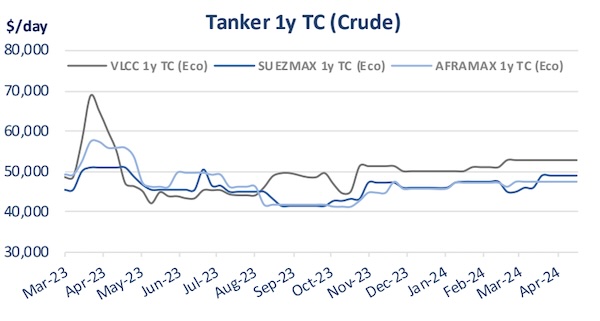Middle East Tensions to Impact the Tanker Market Middle East Tensions to Impact the Tanker Market

The tanker market is bound to be further impacted by the escalation of the Middle East tensions. In its latest weekly report, shipbroker Xclusiv said that “news of an Israeli strike on Iranian territory, potentially escalating tensions in the Middle East, sent shockwaves through global markets. Geopolitical uncertainties loom large, capable of swiftly altering the trajectories of commodities such as oil, and reigniting concerns over inflation. Although oil prices took a rollercoaster ride on Friday, with WTI climbing to USD 86/barrel, reports suggested the attack was less extensive than initially believed, with Iran’s key nuclear facilities seemingly untouched. Additionally, Iran downplayed the attack and any possibility of immediate retaliation. This reassessment of the situation caused oil prices to erase earlier gains, with WTI closing the week at USD 82/barrel”.

Source: Xclusiv
According to the shipbroker, “rising tensions in the Middle East and stricter sanctions against Iran could impact the supply of LPG, posing risks to Iranian exports. Concurrently, ongoing cuts by OPEC+ are further limiting outflows from the region. Iran, a significant player in the LPG market, saw exports of around 1,000,000 metric tons in March, with April’s volumes currently standing at 600,000 metric tons. Following Iran’s actions against Israel, the US is set to impose additional sanctions on the country. Additionally, legislation aimed at obstructing China’s consumption of Iranian crude oil has been passed with strong support. In light of these developments, concerns have arisen regarding how stricter US sanctions could impact oil supply and potentially disrupt LPG flows. Despite rising tensions between Israel and Iran, China’s independent refineries are expected to keep buying Iranian crude. As the US imposed new sanctions on Iran’s drone program and hinted at potential oil export sanctions, China’s independent refiners, which rely heavily on Iranian oil (accounting for 40-50% of their imports), have found ways to keep these purchases flowing”, Xclusiv said.

Meanwhile, in America, in a novel move, “the US has reimposed broad oil and gas sanctions on Venezuela. However, they’ve left the door ajar by allowing companies to apply for specific licenses. This approach aims to minimize disruption to global oil markets, particularly during a US election year, while also encouraging gradual political progress in Venezuela. The shift from a general license to company-specific ones could provide more stability for businesses seeking to operate in Venezuela. Additionally, it might benefit the political opposition hoping to build momentum beyond the upcoming July presidential election. The ultimate impact on global oil markets, however, remains unclear and it will depend on how many companies apply for licenses and the US Treasury’s processing speed. The interplay between geopolitical factors and economic realities often shapes global oil markets. With the renewed US sanctions on Venezuelan oil, India appears less likely to compete for its crude. However, China, Asia’s top oil consumer, may not significantly increase purchases. The dynamics of supply and demand, coupled with pricing competitiveness, will likely dictate the extent of Chinese refinery purchases. Interestingly, when competition with India heated up after Venezuela’s sanctions lifted late last year, China’s independent refineries actually reduced Venezuelan imports by 40%. Venezuela may need to reassess its pricing strategy to attract greater interest from Chinese refiners, especially considering the abundant options China currently enjoys from various sources”, Xclusiv said.

Source: Xclusiv
The shipbroker concluded that “the reimposition of Venezuelan sanctions and additional sanctions on Iran will likely reshape seaborne oil trade. However, the extent of the impact remains unclear. It’s uncertain whether this reshuffling will significantly boost freight rates or simply rearrange ton-miles without major rate fluctuations”.
Source: Nikos Roussanoglou, Hellenic Shipping News Worldwide
- 4/24/2024
- Shipping News

